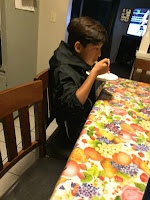Vocabulary
Town - a thickly populated area, usually smaller than a city and larger than a village, having fixed boundaries and certain local powers of government.
charter - a document, issued by a sovereign or state, outlining the conditions under which a corporation, colony, city, or other corporate body is organized, and defining its rights and privileges
Guild - an organization of persons with related interests, goals, etc., especially one formed for mutual aid or protection.
Guild Hall - (in Britain) the hall built or used by a guild or corporation for its assemblies; town hall.
Journeyman - a person who has served an apprenticeship at a trade or handicraft and is certified to work at it assisting or under another person.
Apprentice - a person who works for another in order to learn a trade: an apprentice to a plumber
Merchant - a person who buys and sells commodities for profit; dealer; trader.
Barter - to trade by exchange of commodities rather than by the use of money.
Carpenter - a person who builds or repairs wooden structures, as houses, scaffolds, or shelving.Cobbler - a person who mends shoes.
Glover - a person who makes or sells gloves.
Blacksmith - a person who forges objects of iron.
Tinker - a person who travels from place to place mending metal utensils as a way of making a living.
potter - a person who makes pottery.
cooper - a maker or repairer of casks and barrels.
wheel right - a person who makes or repairs wooden wheels.
tanner - a person who tans animal hides , especially to earn a living.
baker - a person who makes bread and cakes , especially commercially.
butcher - a person whose trade is cutting up and selling meat in a shop.
inn - an establishment providing accommodations, food, and drink, especially for travelers.
tavern - an establishment for the sale of beer and other drinks to be consumed on the premises, sometimes also serving food.
barber - The barber surgeon is one of the most common medical practitioners of medieval Europe – generally charged with looking after soldiers during or after a battle
fuller - a person who fulls cloth
miller - a person who owns or works in a grain mill.
brewer - to make (beer, ale, etc.) by steeping, boiling, and fermenting malt and hops.
stable - not likely to change or fail; firmly established.
craft guild - an association of workers of the same trade for mutual benefit.
merchant guild - a medieval guild composed of merchants.
wattle and daub - a material formerly or traditionally used in building walls, consisting of a network of interwoven sticks and twigs covered with mud or clay.





